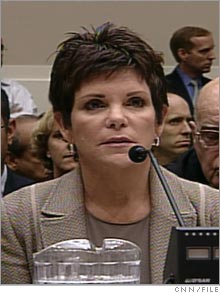Ousted HP head likely to reject plea dealFour other defendants in the spy case are also expected not to take the plea deal offered by state prosecutors.SAN FRANCISCO (CNN) -- Ousted Hewlett-Packard Chairwoman Patricia Dunn is not expected to accept a plea deal offered to her by the California attorney general in the HP spy case, "at least until there's something more concrete from the federal government," a source with knowledge of the case told CNN. The source, who did not want his name used because the court case is pending, also said the other four defendants in the case are not expected to take the plea deal offered by former California Attorney General Bill Lockyer (see correction), due to the ongoing federal investigation.
Lockyer, who aggressively pursued the HP spying case while serving as Calfornia's top prosecutor, moved to the office of state Treasurer early this year. Serving in the attorney general's office now is Jerry Brown. In late December, all five defendants in the case were offered a plea deal reducing their state felony charges to a misdemeanor, in exchange for their guilty pleas, according to Stephen Naritil, who represents private investigator Bryan Wagner. All five defendants - Wagner, Dunn, former HP Ethics Officer and Senior Counsel Kevin Hunsaker, and two other men, Ronald DeLia and Matthew DePante, hired by the company to investigate the leaks to the media from within HP's board of directors - were charged with multiple felonies, including conspiracy. Hunsaker's attorney, Michael Pancer, said his client is not "involved in any plea negotiations with the state because Kevin hasn't broken any laws and we see no need for a plea bargain." A spokesman for the attorney general's office refused comment on the plea negotiations. Under the plea agreement, the judge would decide the defendants' sentence, Naritil said. A misdemeanor in California is punishable by up to two years in jail. In November 2005, Dunn, Hunsaker, Wagner, DeLia and DePante all pleaded not guilty to the state charges in a Santa Clara courtroom. Dunn was charged with four felony counts: Conspiracy; fraudulent use of wire, radio or television transmissions; taking, copying and using computer data; and using personal identifying information without authorization. In the wake of the scandal, Dunn stepped down from her post. She has denied knowing that illegal tactics would be used in the investigation. As HP chairman, Dunn initiated two separate investigations - one in 2005 and one in 2006 - into the source of a board of trustees leak to the media. It was later alleged that the probe involved questionable practices, including pretexting - obtaining personal confidential information through false pretenses - to spy on HP directors, journalists and employees. Those allegations sparked the state and federal investigations. Wagner pleaded guilty last week to federal charges. Naritil said he plans to file a motion on Wagner's behalf asking for the state charges against him to be dismissed, so Wagner is not accepting the deal. Wagner was the only defendant charged by the federal government. But Kevin Ryan, U.S. attorney for the Northern District of California, said late last year his office was considering federal charges against the other four. Ryan stepped down earlier this week. A representative from the Northern District would not comment on the federal case or any possible future charges because the investigation is ongoing. Dunn, Hunsaker, DeLia and DePante are next expected in court on Feb. 28. Calls to DeLia and DePante's attorneys were not returned Friday. Shares of HP (Charts) fell 0.7 percent on the New York Stock Exchange Friday. Correction: An earlier version of this story referred to Bill Lockyer as Calfiornia's attorney general. CNNMoney.com regrets the error. Back to story. |
Sponsors
|

